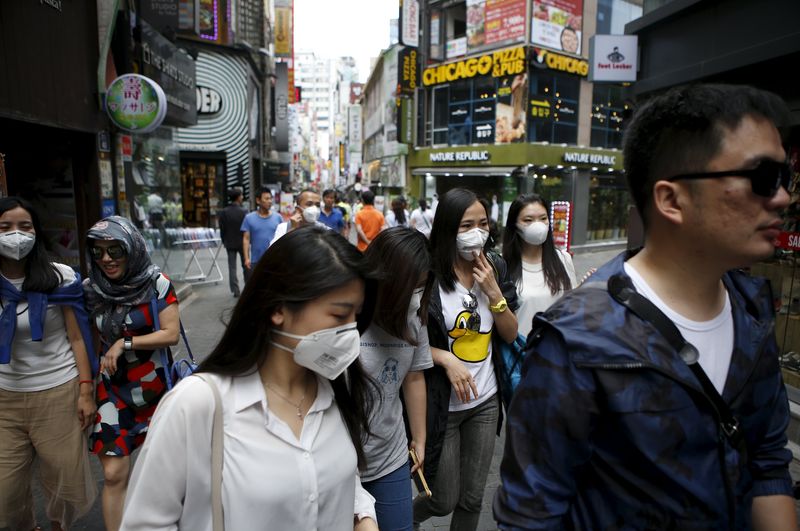This is where Deutsche Bank sees silver prices ending the year
* Local beef prices at record high due to declining herd
* Rebuilding herd expensive given record high calf prices
* Jan-Aug beef imports at highest since 2011 -customs
* Australian beef exporters the main beneficiary
By Rebecca Jang and Meeyoung Cho
HONGSEONG, South Korea, Sept 25 (Reuters) - Soaring South
Korean beef prices should be welcome news for its hard-pressed
cattle farmers, but a failure to rebuild herds and customers
balking at paying record levels for prized local "Hanwoo" meat
mean imports are set to keep pouring in.
Overseas purchases by the world's sixth-biggest buyer are at
four-year highs and a further rise is expected in 2016 - mainly
benefiting Australia - as South Koreans' loyalty towards local
beef is tested by prices climbing 35 percent in eight months.
Native bred Hanwoo cattle are often pampered by their
farmers and South Koreans consider the meat top class, at least
akin to Japan's globally recognised Wagyu beef. While locals
have been prepared to pay more for Hanwoo, their willingness to
shell out extra may have reached a tipping point now.
"Hanwoo is the food we cannot skip on special days like
holidays and rituals for ancestors, but on a regular basis my
husband and I eat imported beef as Hanwoo is so expensive," said
Park Hee-jung, a 62-year-old housewife, who was shopping at a
department store in Seoul.
Local beef ribs currently fetch 4,912 Korean won ($4.13) per
100 grams, almost triple the price of Australian ribs, data from
Korea Agro-Fisheries & Food Trade Corp shows.
And according to a survey by Korea Rural Economic Institute,
this is much higher than the 1.67 times more South Koreans are
prepared to pay over the price of Australian ribs.
"It's a tough time to sell," said cattle farmer Min Jae-ki,
who also runs a butcher's restaurant in Hongseong, 150
kilometres (93 miles) southwest of Seoul.
"We are charging the same as before although beef prices
have gone up. Otherwise customers won't come."
Min said the cost of supplying beef to his restaurant, where
customers can barbecue meat after selecting it, had increased by
1 million won per cattle from a year ago. Margins have been
squeezed further after beef prices rose to a record of 6.9
million won per 600 kg in August.
PEDIGREE IS IMPORTANT
The price of Hanwoo beef is likely to rise further as cattle
numbers dropped 14 percent over two years to 2.66 million this
March with many small farmers forced out of business after a
prolonged slump in prices since 2010.
Herds have also been decimated by outbreaks of
foot-and-mouth disease and it will be difficult to rebuild them
quickly with calves fetching a record price of 3.5 million won
now.
"If you are buying calves you first have to punch a
calculator to see how much you can earn," said Yoo Kwan-jo, a
57-year-old farmer raising 650 cattle in Hongseong.
Almost all of the beef cattle population in South Korea is
Hanwoo and breeding it requires attention to pedigree. The Korea
Animal Improvement Association is the only organization approved
by the state to register and evaluate pure-bred Hanwoo cattle.
Farmer Yoo said he includes corn and rye grown on the farm
in the feed he gives to his cattle and even pipes music into the
sheds in a bid to help stimulate healthy growth.
"As parents provide good food to help their kids grow pretty
and well, we treat the cow in the same way," said Yoo, who used
to individually massage cows when he had a smaller herd, but now
uses a comb machine to brush and pat their backs.
HIGHER IMPORTS FROM AUSTRALIA SEEN
With fewer Hanwoo cattle and higher prices, South Korean
beef imports have risen. Purchases from Australia rose 11
percent in the first eight months of 2015 to over 113,000
tonnes, data shows. Total imports were at 200,000 tonnes, up 4
percent on year or the highest since January-August in 2011.
"High prices for domestic beef will boost imports further
next year," said Lee Hyung-woo, a research associate at the
Korea Rural Economic Institute.
Australian beef will likely be the winner with lower tariffs
under a free trade agreement also helping. ID:nL4N0W51Y2
In Australia, the world's No.3 beef exporter, farmers are
slaughtering at a near-record pace as a drought worsened by an
El Nino weather pattern scorches pastures. ID:nL4N11K2YC
"Korea has been a very strong and stable market for us over
the last three or four years ... Australia is on track to send
about 150,000 tonnes beef to South Korea this year," said Ben
Thomas, manager of market information at industry body Meat and
Livestock Australia in Sydney.
($1 = 1,190.6800 won)
<^^^^^^^^^^^^^^^^^^^^^^^^^^^^^^^^^^^^^^^^^^^^^^^^^^^^^^^^^^^
GRAPHIC: South Korea beef imports http://link.reuters.com/hys65w
S.Korea says finds cattle infected with foot-and-mouth
ID:nL3N0UL2I7
^^^^^^^^^^^^^^^^^^^^^^^^^^^^^^^^^^^^^^^^^^^^^^^^^^^^^^^^^^^>
